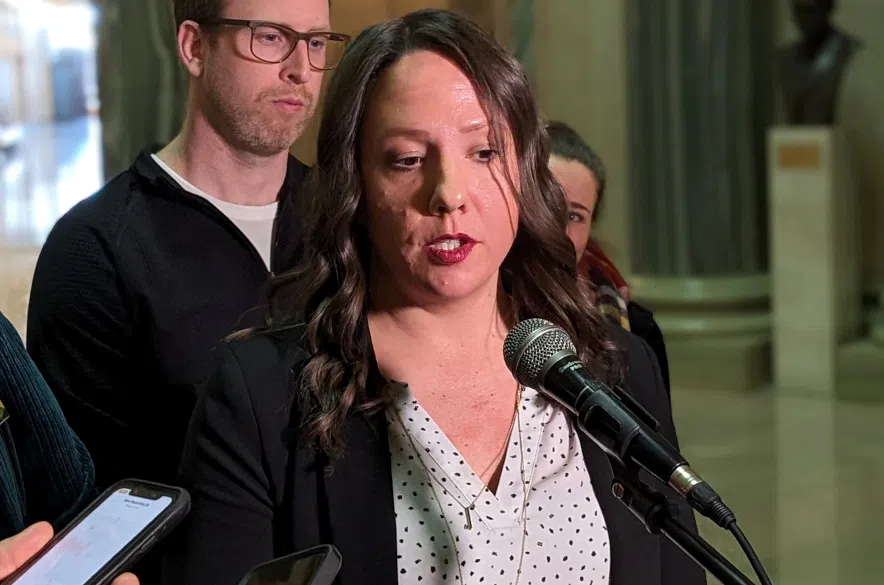As the Saskatchewan Teachers’ Federation and Premier Scott Moe continue to spar amid stalled contract negotiations, the union has announced its latest round of sanctions.
In a media release issued Friday, the STF said teachers will withdraw supervision of extracurricular activities provincewide on Monday, Tuesday and Wednesday of next week. That means educators won’t help with things like athletics, non-curricular arts, field trips, student travel, graduation preparations, school clubs and other activities.
There also will be a one-day withdrawal of lunch-hour supervision on Monday at schools in the Creighton, Holy Trinity Catholic, Horizon, Lloydminster Public, Lloydminster Catholic, Northwest, Prairie South, Prairie Valley, Saskatchewan Rivers and Prince Albert Catholic school divisions.
The announcement comes two days after Moe unveiled the government’s plan for increased education spending in the upcoming provincial budget. The teachers’ union responded by saying it believes the government could back away from that promised funding down the road.
The issues of class size and classroom complexity remain the sticking point. The union has said it won’t return to the bargaining table until those issues are included in the collective agreement.
“While this week’s funding announcement is welcome, it does not guarantee ongoing, predictable and sustainable funding for education,” STF president Samantha Becotte said in the release.
“We have said on many occasions that a new collective agreement is within reach; government simply has to come to the bargaining table with a mandate to negotiate class size and complexity.”
The government repeatedly has said that is a non-starter, suggesting that those matters should be dealt with by locally elected school boards. The Saskatchewan School Boards Association sided with the government on that.
The previous contract between the teachers and the government expired in August, with the union declaring an impasse in negotiations in October.
Teachers then voted overwhelmingly in favour of sanctions, but didn’t take any action until the new year. Since then, teachers have staged rotating strikes, withdrawn lunch-hour supervision, and withheld the supervision of extracurricular activities.
Without teachers or principals available to supervise students who eat lunch at school, divisions have been forced to rejig their daily schedules.
“Teachers understand that the withdrawal of noon-hour supervision and extracurricular activities is a concern for many students and families,” the STF said in Friday’s release.
“Parents and caregivers concerned about the impact of job action should contact their MLA and elected school board trustees and encourage the government’s bargaining committee to return to the table with a new mandate.”
Becotte on Bray
On The Evan Bray Show on Friday, Becotte was asked why the union isn’t buying what the government is saying about education funding.
“We know that government works in election cycles,” she replied. “We completely expected this budget to be a win budget for education, and I assume other sectors.
“We need predictable and sustainable funding, because our kids’ needs don’t come and go with election cycles. So we are looking for a longer-term commitment to know that the funding that’s being announced here in the budget — which is good; we are going to see an increase (because) it starts to repair some of the damages to the $400-million gap that we have been talking about — but we need to know that’s going to continue.
“We have a history with this government where they have provided funds to education and then clawed them back. In 2017, they took over $50 million out of the education budget, and then in 2018 didn’t sign the teachers’ contracts. So we’ve been through similar experiences, and that’s when we say we aren’t going to fall for it. We need to have long-term meaningful commitments where the government is going to be help accountable to that funding for students.”
Moe has said Saskatchewan families already invest more in education than families in any other province in the country, but Becotte said that’s not the best measuring stick.
“I know the government likes to talk about per-capita spending. When we talk about funding for education, we talk about per-student funding because that is more accurate to the supports that students are receiving,” she said.
“We have transportation issues. The cost to get kids to school is a big issue we have. We have more rural and remote areas in Saskatchewan; there are more people living in rural and remote areas. That also impacts the ability to deliver a high-quality education. We are not saying that we need exactly what these other provinces have within our collective agreement. We can find our collective agreement that is Saskatchewan made.”
Becotte noted that Moe and Education Minister Jeremy Cockrill have said the government will continue the funding if the Saskatchewan Party is re-elected. That didn’t sit well with her.
“It shouldn’t come in election promises,” she said. “It should be, ‘This is better for kids. We are committed to this funding, and we are going to put it in writing — (and) not just one year in this budget we will provide and improve funding, but next year and the year after and the year after, and we can do it over a four-year period.’ ”











